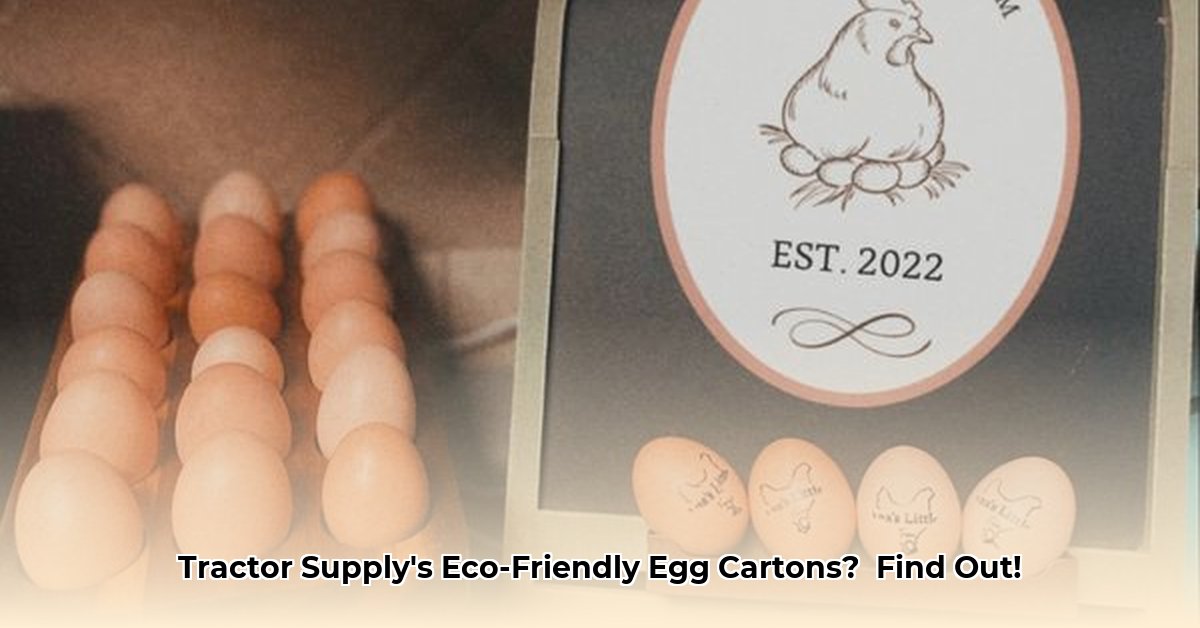
Choosing the right egg cartons isn't just about protecting your eggs; it's a vital step in sustainable agriculture. This guide shows you how to select eco-friendly cartons from Tractor Supply, optimizing your egg production for both efficiency and environmental responsibility. We'll cover egg collection methods, sustainable carton options, storage practices, waste reduction strategies, and how it all contributes to a thriving, eco-conscious farm. For more on sustainable farming practices, check out this guide on building a chicken tractor.
Egg Collection Methods: Balancing Efficiency and Animal Welfare
Efficient egg collection is crucial, impacting both your workload and your hens' well-being. Two primary methods exist: manual and automated.
1. Manual Collection: This hands-on approach allows for close observation of your hens, ensuring their health and comfort. It requires minimal upfront investment. However, it's time-consuming, especially with larger flocks, and carries a higher risk of accidental breakage.
2. Automated Systems: For larger farms, automated systems offer significant efficiency gains. Conveyor belts gently transport eggs, minimizing labor and breakage. However, these systems represent a higher initial investment and require maintenance.
Which method best suits your farm? This depends on your flock size and budget. Small-scale operations may find manual collection sufficient, while larger commercial farms will benefit from automation.
Selecting Sustainable Egg Cartons at Tractor Supply: Eco-Friendly Choices
Tractor Supply provides various sustainable egg carton options, each with unique environmental and economic implications.
1. Recycled Cardboard: A cost-effective and widely available option, promoting resource conservation. Look for cartons with high recycled content.
2. Biodegradable Pulp Cartons: Made from plant fibers, these cartons naturally decompose, minimizing landfill waste. They are a strong environmentally conscious choice.
3. Compostable Cartons: These cartons fully decompose, enriching your soil. Verify certifications to ensure they meet composting standards.
Cost Comparison: While upfront costs vary, consider the long-term implications of waste disposal. A seemingly cheaper option might lead to higher disposal costs and a larger environmental impact.
| Carton Type | Approximate Cost (per dozen) | Environmental Impact |
|---|---|---|
| Recycled Cardboard | $0.50 - $1.00 | Low (if recycled properly) |
| Biodegradable Pulp | $1.00 - $1.50 | Moderate (biodegradable) |
| Compostable Carton | $1.50 - $2.00 | Low (compostable) |
(Note: Prices are estimates and may vary based on location and quantity.)
Egg Storage and Handling: Maintaining Freshness and Minimizing Breakage
Proper storage and handling maximize egg freshness and shelf life.
- Gentle Handling: Always handle eggs carefully to prevent cracks.
- Cool, Dry Storage: Store eggs in a cool, dry place (ideally around 45°F) away from strong odors.
- Carton Storage: Keeping eggs in their cartons provides additional protection.
- Refrigeration (Optional): While not always necessary, refrigeration can extend freshness.
Waste Reduction Strategies: Recycling and Composting
Minimize your environmental footprint by effectively managing egg carton waste.
- Recycling: Check your local guidelines for recyclable carton types.
- Composting: Compost biodegradable or compostable cartons to enrich your soil.
Integrating Sustainability into Your Farm Management: A Path to Profitability
Sustainable practices improve farm efficiency and profitability. Reduced waste lowers costs, while eco-conscious consumers often prefer sustainably sourced products, potentially commanding premium prices. Continuously evaluate your methods, adapting to optimize efficiency and sustainability.
Three Key Takeaways:
- Prioritize egg collection methods that balance efficiency with hen welfare.
- Choose sustainable egg cartons considering both environmental impact and cost.
- Implement proper storage, handling, and waste reduction strategies.
Visit your local Tractor Supply to explore sustainable egg carton options and other environmentally friendly farm supplies. Invest in a sustainable future – it’s good for your farm and the planet.